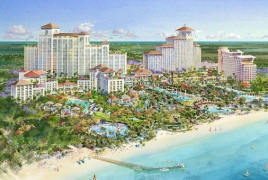Chinese bank drives Izmirlian out of his own $3.5 billion project January 18, 2016 - 14:59 AMT PanARMENIAN.Net - Herald Tribune presents an article on Baha Mar, the largest and, at $3.5 billion, priciest resort in the Caribbean, which is the biggest business story to hit the Caribbean for as long as anyone can remember. The article reads: Turns out that even in paradise, local aspirations can collide with China’s global ambitions. Baha Mar may have been dreamed up in the vacationland of the Bahamas, but the central government in Beijing controls the development bank and construction giant that will determine its fate. And China, some Bahamians say, is playing tough as its state-run enterprises project money and influence around the world, including to this small island 180 miles off the coast of Miami. Time is short. Bahamian officials have been counting on Baha Mar to invigorate the tourist economy. The developers claimed the resort could single-handedly generate 12 percent of the country’s gross domestic product — provided it ever opens. Understanding the island’s predicament requires going back more than a decade to 2005, when Prime Minister Perry Christie reached an agreement with a local businessman Sarkis Izmirlian to help revitalize Cable Beach, the most popular beachfront destination on New Providence Island. Izmirlian, then just 32, seemed a natural choice. He’s from a wealthy family — his father is Armenian peanut tycoon Dikran Izmirlian — and lives on nearby Lyford Cay, a billionaire enclave. Izmirlian sank nearly $900 million into Baha Mar and recruited prominent partners like a Caesars Resort hotel. Then the 2008 financial crisis hit, and would-be partners balked. When China State Construction Engineering Corp., the world’s second-largest contractor, approached Izmirlian about stepping in, he said yes. The company directed him to Export-Import Bank of China, or Exim, which promotes trade and investment under the direction of Beijing. Seeing a way into U.S. markets, China State Construction promptly invested $150 million. Exim kicked in $2.45 billion in construction loans — with the proviso that Izmirlian could never fire the Chinese builder, no matter what, and that workers from China would do the job. Flush with Chinese money, Izmirlian declared four Baha Mar hotels would open by 2014. In May 2014, Izmirlian appealed to an independent mediation service based in Washington, D.C., but the troubles multiplied. Pipes burst when inspectors tested the fire sprinklers and faulty balcony railings had to be reinforced, people with knowledge of the construction said. When Izmirlian complained, China delayed its money, one said. As construction dragged on, Izmirlian and Christie flew to Beijing. There, officials assured them the resort would be ready to open on March 27. Upon his return, the developer hired 2,070 hotel workers, ran a global ad campaign and stocked the casino with $4.5 million in cash. Izmirlian the was spending an additional $4 million a month to pay staff for a hotel with no guests. Concerned that China State Construction might gain a tactical advantage by filing first, he secretly planned to have Baha Mar declare bankruptcy in the U.S. rather than the Bahamas, whose laws would make liquidation all but inevitable. Baha Mar Ltd. filed for bankruptcy in Delaware on June 29 — and all hell broke loose. China State Construction accused Izmirlian of disrupting the project with endless design changes. As the dispute dragged into September, a Delaware judge dismissed the U.S. bankruptcy and a Bahamian judge put provisional liquidators in charge, rendering Izmirlian’s $900 million investment nearly worthless. In October, they hosted negotiations at a nearby hotel. In November, Izmirlian said he was still negotiating with Exim and hoped to remain involved. Failing that, he’s also sued in the UK, claiming about $192 million in damages for a breach of contract. How it’ll end is anyone’s guess. Fernando Menendez, a senior fellow at Washington think tank Center for a Secure Free Society, says the episode says less about the Bahamas or Izmirlian than it does about China and its state-owned enterprises. China Exim wielded billions to guarantee work for one of its biggest customers, China State Construction. How and when that work got done didn’t really matter: Exim made sure the state-run company could never be fired. “State-owned enterprises don’t function as competitive entities,” Menendez says. “They’re protected from failure.” Christie says he’s still optimistic the resort can open. In December, Exim said a number of potential investors had expressed interest. These include Guo Guangchang, chairman of a non-state Chinese conglomerate called Fosun Group, people familiar with the situation say. Fosun already owns stakes in Club Mediterranee SA and Cirque Du Soleil Group. The number of state universities will be reduced from 23 to 8 by 2030, Minister of Education, Science, Culture and Sport Zhanna Andreasyan has said. From September 21 to November 11, a total of 2,820 Russians registered at a place of residence in Armenia, the police has said. The situation on the contact line between Karabakh and Azerbaijan was relatively stable overnight, the Defense Army says. Defense Minister Suren Papikyan has visited the southern Armenian province of Syunik, the Defense Ministry reported on March 18. Partner news |